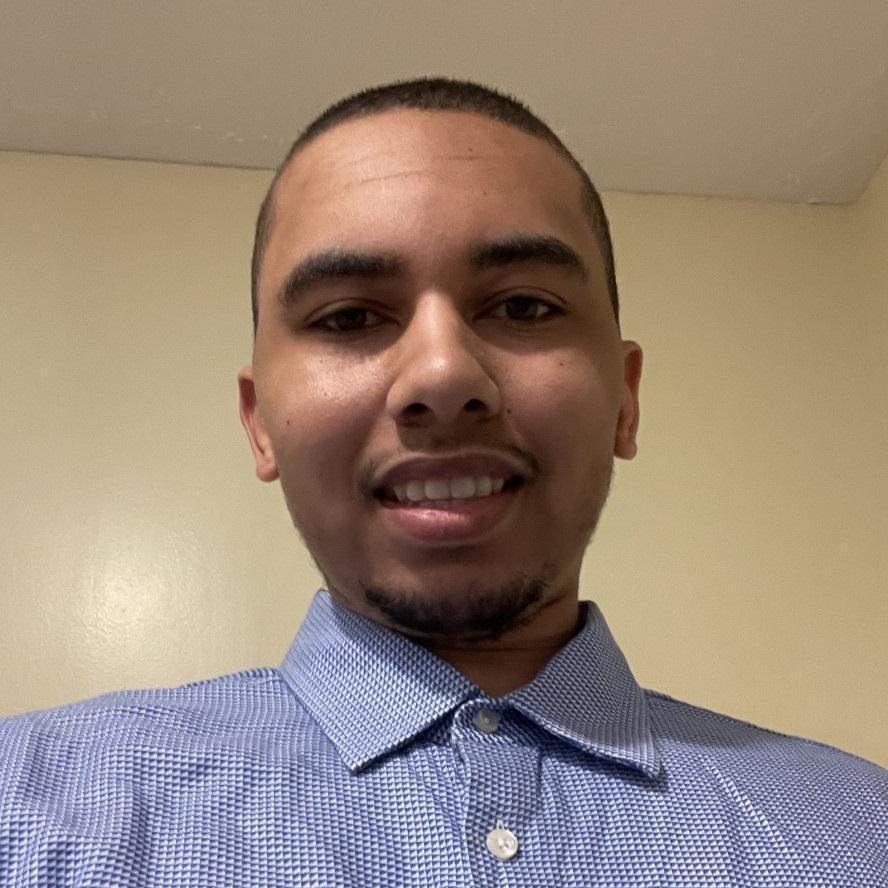
Emeka Chima
Expert in Information Systems and Peer Support Specialist: Emeka Chima
Emeka Chima earned an associate of arts degree from Montgomery College in Germantown, Maryland, in 2020, and in 2022 he received a bachelor’s degree from the University of Maryland Global Campus in the field of Information Systems. At Montgomery College, he was a Dean’s List recipient twice and was inducted into the Phi Theta Kappa Honor Society. He currently works as a peer support specialist for an outpatient mental healthcare clinic for first episode psychosis adolescents and young adults.
Raised by his Nigerian father and his mother from Washington, D.C., Emeka experienced a happy childhood. As the oldest of five, he had the privilege to watch over his younger siblings. In high school, he played soccer and flag football, winning three trophies. His mother is currently a cybersecurity analyst for a Department of Defense contractor. Emeka would also like to work in such a field.
However, about age 15, Emeka began to hear voices. Initially, while in class, the voices would command him to look away in the distance. Gradually, the voices became more powerful, telling him to isolate himself from others, even family members whom he loved.
Uma noite, as vozes ordenaram que Emeka se cortasse com uma faca. Ele começou a delirar, acreditando que se apenas se machucasse, “tudo ficaria bem”. Ele se lembra de ter entrado em pânico e gritado enquanto brandia uma faca no ar. Olhando para trás, Emeka se esforça para descrever seus pensamentos na época. Ele sentiu como se precisasse fugir.
A tia de Emeka o ouviu gritando e acalmou a situação, acalmando-o, enquanto o convencia a largar a faca. Posteriormente, Emeka se sentiu culpado por “agir mal”, sem saber que estava lutando contra o início de uma doença mental grave.
A few weeks later, Emeka had a similar experience, brandishing another knife, but this time he was alone. The voices commanded him to keep the knife with him at all times for self-defense. Although the voices sounded like a family member to Emeka, he realized that his family would never want him to harm himself. In the following days, Emeka confided in his father that he was hearing voices and stated that he might need help.
Soon after, during the night, Emeka began hallucinating again. This time, he heard a crowd of people, unexpected visitors who came without immediate warning and seemed closer in his imagination than reality. As the night went on, Emeka heard a voice consoling him and confirming that everything would be okay, as well as another voice telling him to hurt himself.
Na manhã seguinte, quando o pai de Emeka visitou Emeka em seu quarto, ele pensou que Emeka poderia estar tendo uma convulsão. O avô paterno de Emeka lutou por muitos anos contra o transtorno bipolar, e seu pai suspeitava que Emeka também sofria de problemas mentais. Juntos, eles foram para o hospital.
Enquanto estava no hospital, Emeka foi diagnosticado com esquizofrenia paranóide. Ele ainda tinha apenas 15 anos. Apesar da devastação de saber que ele tinha um distúrbio cerebral, Emeka descobriu que seus sintomas poderiam ser explicados por seu diagnóstico, o que lhe deu alívio. Ele também descobriu que havia tratamento. Depois de três semanas na ala psiquiátrica, ele alcançou a estabilidade, recebeu alta e voltou à escola. Ele ainda era um júnior na época.
The next year was difficult for Emeka. The first medications he tried left his eyes bloodshot, and he felt like he had a hangover though he never drank alcohol or abused drugs. He did not have a regular doctor and often forgot to take his medication. Over the next year, he was hospitalized four times for breakthrough symptoms, but the hospitalizations resulted in little benefit.
During September of Emeka’s senior year of high school, however, he had a new start when he was accepted into a treatment program called EPIC (Early Psychosis Intervention Clinic) through Johns Hopkins Medicine. Through EPIC, Emeka began a trial of clozapine, a medication for treatment-resistant patients. Within a week, Emeka began to see great improvement. He recalls feeling like his recovery on clozapine was a “miracle.”
On clozapine, Emeka finished high school with high honors, winning awards for every class. He did not know exactly what career he wanted to pursue, but he was confident that he would succeed.
After high school, Emeka completed his information systems degree and has recently received honors towards his bachelor’s degree at the University of Maryland Global Campus. He has also been involved with the nonprofit organization, Students with Psychosis since April 2020 and serves as President on its Executive Board.
Emeka says: “When it comes to young people with brain disorders, I would advise not to hesitate to receive help because there is both a physical and emotional need to be surrounded by people who understand. Working through the recovery process can feel overwhelming, but we can develop the resilience to achieve mental wellness.”

